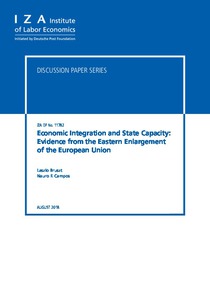Economic integration and state capacity: evidence from the eastern enlargement of the European Union
"We investigate whether and how economic integration increases state capacity. This important relationship has not been studied in detail so far. We put together a conceptual framework to guide our analysis that highlights what we call the Montesquieu, Weber and Smith channels. Each of these co...
| Main Authors: | , |
|---|---|
| Institution: | ETUI-European Trade Union Institute |
| Format: | TEXT |
| Language: | English |
| Published: |
Bonn
2018
IZA |
| Subjects: | |
| Online Access: | https://www.labourline.org/KENTIKA-19303396124911215789-economic-integration-and-state.htm |
| Summary: | "We investigate whether and how economic integration increases state capacity. This important relationship has not been studied in detail so far. We put together a conceptual framework to guide our analysis that highlights what we call the Montesquieu, Weber and Smith channels. Each of these correspond to a series of mechanisms in three distinct institutional arenas: judiciary, bureaucracy, and competition policy. To test our framework, we introduce a new panel of institutional reform measures which allow us to investigate how changes in these three arenas interact with each other and what sequence of changes yields increase in state capacity. The yearly data set covers all the 17 countries that became candidates to join the European Union (EU) after the 1995 enlargement. Our main finding is that the relationship between bureaucratic independence and judiciary capacity seems to be the key engine of the process of state capacity building engendered by the prospect of EU membership. Deep integration, we find, can induce broad institutional change by providing incentives for simultaneous change in core state institutions. Yet early and abrupt removal of external anchors might generate significant backsliding, or reversals, in domestic institutional change." |
|---|---|
| Physical Description: | 57 p. Digital |

